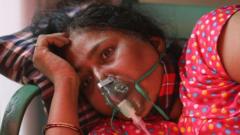In March 2020, India initiated a strict lockdown, signaling the onset of a crisis that deeply affected not just health systems but also the lives of many within the country. Five years later, BBC journalists recount the harrowing realities they faced and the stories they covered of despair, loss, and resilience in the face of an unprecedented health emergency.
'Five Years On: The Harrowing Memories of BBC Journalists During India’s Covid Lockdown'

'Five Years On: The Harrowing Memories of BBC Journalists During India’s Covid Lockdown'
As the world reflects on the pandemic's impact, BBC correspondents share their emotional experiences from India's devastating Covid-19 lockdown.
On March 24, 2020, India took a drastic step by initiating its first Covid lockdown, marking the beginning of an unprecedented health crisis global in scale. With a healthcare system that was already teetering on the brink, the nation found itself overwhelmed, with an estimated 4.7 million deaths linked to Covid—numbers starkly contrasting with the official government count. As journalists for the BBC, many experienced firsthand the heart-wrenching stories that unfolded during this dark period.
Soutik Biswas recalls the traumatic spring of 2021, where he found himself urgently answering an SOS for oxygen from a school teacher battling to save her husband in a Delhi hospital. The realities of scarcity were grim; oxygen felt like a valuable commodity while lives hung in the balance. Everyday conversations morphed into desperate pleas for life-saving equipment as the city grappled with a relentless second wave of infections.
The pain was palpable in Yogita Limaye's haunting account of a woman pleading for her brother’s life outside a hospital, only to see him lost before receiving treatment. Witnessing the helplessness of families forced to riotously search hospitals for treatment highlighted a significant failure of the governance in a crisis. Reports were littered with stories of tragedy, as overwhelmed hospitals scrambled to cope with demand.
Vikas Pandey shared his own struggles while covering the pandemic, as friends and family reached out for help amidst an atmosphere of chaos. He recounted the profound sorrow of Altuf Shamsi, who lost his father and wife within days of each other due to the scarcity of oxygen and medical assistance. The personal toll of Covid hit hard, as several journalists lost loved ones while covering stories that had also become their own.
Geeta Pandey described the eerie quiet of the streets the day after the lockdown announcement as families were forcibly separated and lives disrupted beyond measure. They were all hoping for a breakthrough with a vaccine, but not everyone would live long enough to see it. Her heartfelt connection with her mother, who she last visited before the pandemic, emphasizes the deep emotional scars many carry long after the immediate crisis has passed.
Anagha Pathak described a trip documenting the struggles of migrant workers who, after being stranded due to the lockdown, found themselves in dire situations. A poignant image of a pregnant woman enduring an arduous journey under the scorching sun still resonates with her, illustrating the severe impact on vulnerable populations.
Five years on, the personal stories, heartache, and memories etched into the minds of BBC journalists serve as a stark reminder of a pandemic that changed lives forever in India. The lessons learned amid the tumultuous times continue to inform the work of journalists as they navigate through unfolding stories in their wake.



















